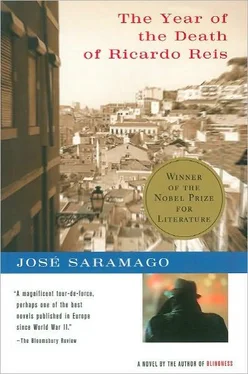José Saramago - Year of the Death of Ricardo Reis
Здесь есть возможность читать онлайн «José Saramago - Year of the Death of Ricardo Reis» весь текст электронной книги совершенно бесплатно (целиком полную версию без сокращений). В некоторых случаях можно слушать аудио, скачать через торрент в формате fb2 и присутствует краткое содержание. Год выпуска: 1992, ISBN: 1992, Издательство: Houghton Mifflin Harcourt, Жанр: Современная проза, на английском языке. Описание произведения, (предисловие) а так же отзывы посетителей доступны на портале библиотеки ЛибКат.
- Название:Year of the Death of Ricardo Reis
- Автор:
- Издательство:Houghton Mifflin Harcourt
- Жанр:
- Год:1992
- ISBN:9780547546926
- Рейтинг книги:4 / 5. Голосов: 1
-
Избранное:Добавить в избранное
- Отзывы:
-
Ваша оценка:
- 80
- 1
- 2
- 3
- 4
- 5
Year of the Death of Ricardo Reis: краткое содержание, описание и аннотация
Предлагаем к чтению аннотацию, описание, краткое содержание или предисловие (зависит от того, что написал сам автор книги «Year of the Death of Ricardo Reis»). Если вы не нашли необходимую информацию о книге — напишите в комментариях, мы постараемся отыскать её.
Year of the Death of Ricardo Reis — читать онлайн бесплатно полную книгу (весь текст) целиком
Ниже представлен текст книги, разбитый по страницам. Система сохранения места последней прочитанной страницы, позволяет с удобством читать онлайн бесплатно книгу «Year of the Death of Ricardo Reis», без необходимости каждый раз заново искать на чём Вы остановились. Поставьте закладку, и сможете в любой момент перейти на страницу, на которой закончили чтение.
Интервал:
Закладка:
Ricardo Reis is about to descend the Rua dos Sapateiros when he sees Fernando Pessoa standing on the corner of the Rua de Santa Justa. Fernando Pessoa looks as if he has been kept waiting yet shows no sign of impatience, he wears the same black suit, his head uncovered, and, a detail previously unobserved by Ricardo Reis, he is without spectacles. Ricardo Reis thinks he knows why, it would be absurd and in thoroughly bad taste to bury a man in his spectacles, but that is not the reason, they had simply failed to hand them to him in time as he was dying. Give me my spectacles, he had asked, and was left lying there unable to see, for we are not always in time to satisfy the last wishes of the dying. Fernando Pessoa smiles and wishes him good afternoon, Ricardo Reis returns the greeting, and they walk together in the direction of the Terreiro do Paço. A little farther the rain starts up again. One umbrella shelters both of them, and although Fernando Pessoa has nothing to fear from this water, his huddling gesture was that of one who has still not completely forgotten life. Or it could have been the comforting thought of sharing the same roof and so close, Get underneath, there is room for two. No one will turn down such an offer by replying, There's no need, I don't mind the rain. Ricardo Reis is curious, If someone is watching us, whom does he see, you or me. He sees you, or rather he sees a shadowy form that is neither you nor I. The sum of both of us divided by two. No, I would say it is the result of multiplying the one' by the other. Does this arithmetic exist. Two, whatever they may be, are not added up, they multiply. Be fruitful and multiply, says the commandment. Not in that restricted biological sense, dear fellow, take me, for example, I've left no children behind. I'm fairly certain that I, too, shall leave no children behind, nevertheless we are multiple, I wrote an ode in which I say that innumerable people exist within us. I don't recall it. Because I wrote it about two months ago. As you can see, each of us says the same thing. Then there was no point in our multiplying. If we had not multiplied, multiplying would not have been possible. Such a precious conversation, with its Paulist and intersectionist theories, as they walk along the Rua dos Sapateiros down as far as the Rua da Conceição, where they turn left into the Rua Augusta, then straight once more. Stopping, Ricardo Reis suggested, Let's go into the Cafe Martinho, and Fernando Pessoa replied brusquely, That would be unwise, the walls have ears and a good memory, we can go another day when there is no danger of anyone recognizing me, it's a question of time. As they lingered there under the arcade, Ricardo Reis closed his umbrella and said, apropos of nothing, I am thinking of settling here, of establishing a practice, So you have no intention of ever going back to Brazil, why, It's difficult to explain, I'm not even sure that I could give an explanation, let's say that I'm like the insomniac who finally finds a comfortable position on the pillow and can get some sleep. If it's sleep you're after, you've come to the right country. If I accept sleep, it's to be able to dream, To dream is to be absent, to be on the other side, But life has two sides, Pessoa, at least two, we can only reach the other side through dreams, you say this to a dead man, who can tell you from his own experience that on the other side of life there is only death. Well I don't know what death is, but I am not convinced that it is this other side of life we are discussing, because death, in my opinion, limits itself to being. Death is, it does not exist, it is. Are being and existing not the same thing then, No, my dear Reis, being and existing are not the same thing, and not simply because we have these two different words at our disposal, on the contrary it is because they are not the same thing that we have these two words and make use of them. They stood there arguing under the arcade while the rain formed tiny lakes in the square which gathered into larger lakes which became muddy seas. Not even on this occasion would Ricardo Reis go as far as the wharf to see the waves breaking. He was about to say this, to recall that he had been here before, when looking around he saw that Fernando Pessoa was walking away. Only now did he notice that the poet's trousers were too short, making him look as if he were walking on stilts. At last he heard his voice, nearby although Fernando Pessoa was already some distance away, We will continue this conversation another time, I must go now, over there. In the rain he waved his hand but did not say good-bye or I shall return.
The year has started in such a way that deaths are becoming an everyday occurrence. True, every age sweeps away what it can, sometimes with greater ease, when there are wars and epidemics, sometimes at a steady pace, one death after another, but it is most unusual to find so many famous people dying, both at home and abroad, within such a short space of time. We are not referring to Fernando Pessoa, who departed this world a while ago, no one is to know that he comes back from time to time, but to Leonardo Coimbra, who invented creationism, to Valle-Inclan, the author of Romance de Lobos, to John Gilbert, who starred in The Big Parade, to Rudyard Kipling, the poet who wrote If, and last but not least to the King of England, George V, the only monarch with his succession guaranteed. There have certainly been other misfortunes although much less important, such as the poor old man who was buried by a mud slide or those twenty-three people who came from Alentejo and were attacked by a cat with rabies. They disembarked, as black as a flock of ravens with lacerated wings, old folk, women, children being photographed for the first time in their lives, not knowing where they were supposed to look, their eyes gazing up at the sky, flustered and desperate, poor people, but that isn't all. What you don't know, Doctor, is that last November in the main towns of the region two thousand four hundred and ninety-two individuals died, one of them being Senhor Fernando Pessoa. It is not a large or small number, it is what has to be, but the saddest thing is that seven hundred and thirty-four were children under the age of five. If this is the situation in the main towns, thirty percent, imagine what it must be like in the villages, where even the cats have rabies. But we can always console ourselves with the thought that the majority of the little angels in heaven are Portuguese. Furthermore, words can be most effective. When a government takes office, people go in droves to pay their respects to the honorable minister, everyone goes, teachers, civil servants, representatives of the three armed forces, leaders and members of the National Alliance, unions, guilds, farmers, judges, policemen, republican guards, excise men, and members of the general public. The minister thanks each of them with a little speech couched in the patriotism of the school primer and adapted to the ears of his audience. Those who are present arrange themselves so that they can all get into the photograph, the ones in the back rows craning their necks and standing on tiptoe to peek over the shoulder of their taller neighbors, That's me there, they will proudly tell their dear wife when they get home. The ones in front are puffed up with conceit, they have not been bitten by the cat with rabies but they have the same foolish expression, startled by the flashbulb. In the confusion some words were lost but can be deduced from the tone set by the Minister of the Interior at Montemor-o-Velho when he inaugurated the installation of electricity, a great improvement, I shall tell them in Lisbon that the leading citizens of Montemor know how to be loyal to Salazar. We can easily visualize the scene, Paes de Sousa explaining to the wise dictator the name he was given by the Tribune des Nations and that the good people from the land of Fernáo Mendes Pinto are all loyal to your Excellency. With such a medieval regime, it's well known that peasants and laborers are often excluded from that goodness, people who have not inherited possessions, therefore they are not good men, perhaps neither good nor men but creatures no different from these insects that bite or gnaw or infest. You must have had occasion to observe what kind of people inhabit this country, Doctor, bearing in mind that this is the capital of the empire, when you passed the entrance to O'Século the other day and saw the mob waiting for alms. If you wish to see real poverty, go into those districts, parishes, neighborhoods, and see for yourself the soup kitchens, the campaign for helping the poor during the winter months, an admirable enterprise, as the President of the Municipal Council of Oporto said in a telegram, God bless his soul. Don't you think it would have been better to let them die, then we would have spared ourselves the shameful spectacle of life in Portugal, beggars sitting on the curb eating a crust of bread and scraping the bottom of their bowls. They don't even deserve electric lights, all they need to know is the road from their plate to their mouth and that can be found in the dark.
Читать дальшеИнтервал:
Закладка:
Похожие книги на «Year of the Death of Ricardo Reis»
Представляем Вашему вниманию похожие книги на «Year of the Death of Ricardo Reis» списком для выбора. Мы отобрали схожую по названию и смыслу литературу в надежде предоставить читателям больше вариантов отыскать новые, интересные, ещё непрочитанные произведения.
Обсуждение, отзывы о книге «Year of the Death of Ricardo Reis» и просто собственные мнения читателей. Оставьте ваши комментарии, напишите, что Вы думаете о произведении, его смысле или главных героях. Укажите что конкретно понравилось, а что нет, и почему Вы так считаете.












